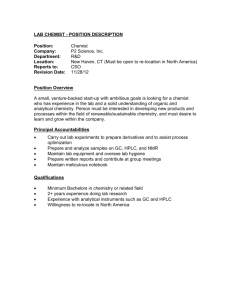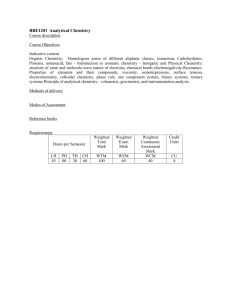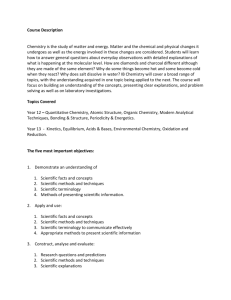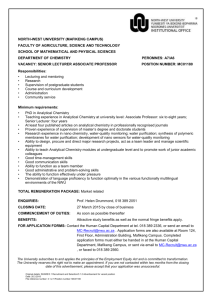Further Particulars HRG158
advertisement
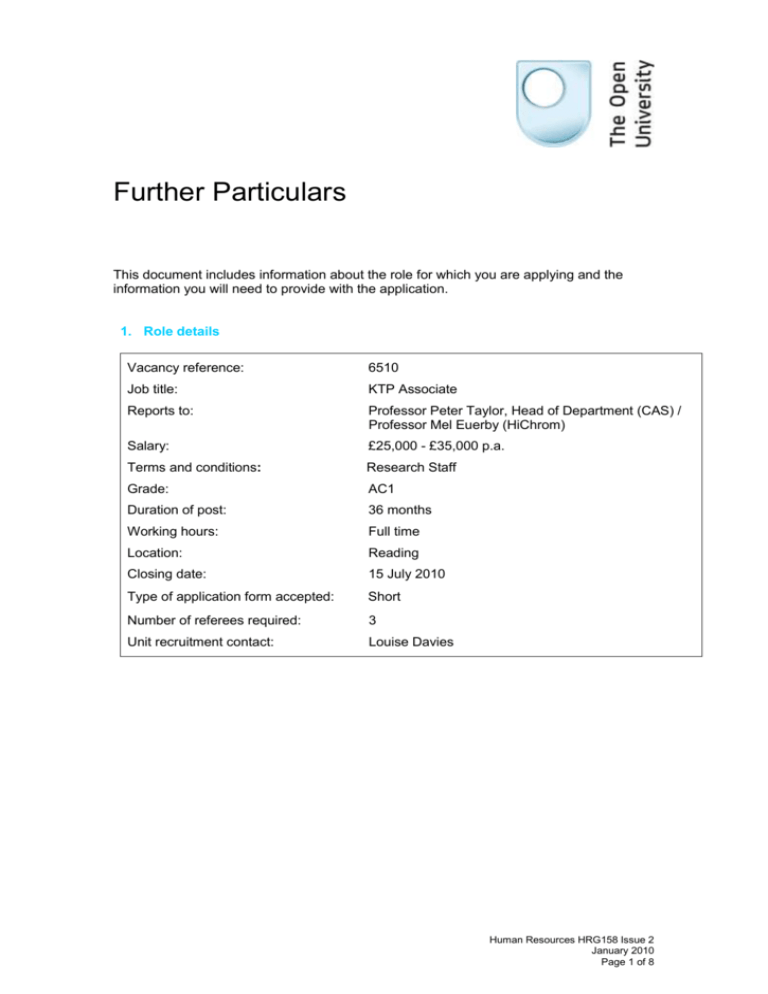
Further Particulars This document includes information about the role for which you are applying and the information you will need to provide with the application. 1. Role details Vacancy reference: 6510 Job title: KTP Associate Reports to: Professor Peter Taylor, Head of Department (CAS) / Professor Mel Euerby (HiChrom) Salary: £25,000 - £35,000 p.a. Terms and conditions: Research Staff Grade: AC1 Duration of post: 36 months Working hours: Full time Location: Reading Closing date: 15 July 2010 Type of application form accepted: Short Number of referees required: 3 Unit recruitment contact: Louise Davies Human Resources HRG158 Issue 2 January 2010 Page 1 of 8 2. Summary of duties This job involves knowledge transfer from the Open University to Hichrom Ltd. Specifically it involves the design and production of novel HPLC phases exhibiting superior performance by combining the chromatography knowledge at Hichrom with the synthetic silane chemistry knowledge at the Open University. The successful candidate will spend most of their time working at the Hichrom laboratories in Reading although a certain amount of time will be spent at the Open University in Milton Keynes. Main duties With guidance identify and design target silane(s) required to develop novel HPLC stationary phase(s) with unique retention and superior performance properties to those currently available. To enable the synthesis and characterization of a range of prototype silanes. To enable the synthesis and characterization of a range of prototype silica supported stationary phases followed by physical characterization and chromatographic characterization of the phase(s). To undertake extensive chromatographic characterisation, validation and testing of the resultant stationary phases. To enable a range of stationary phase(s) to progress to commercialization. In addition, the post holder will be expected to: To organise the KTP Local Management Committee meetings – The Associate will run these meetings, presenting project progress against plan and producing meeting minutes; To produce reports and presentations for key stakeholders; To identify and undertake a programme of self-development as agreed with the academic and company supervisors; Other duties as reasonably required by your supervisors. All staff are expected to: Comply with the University’s and Hichrom’s Health and Safety and Equal Opportunities policies in the performance of their duties. Take reasonable care of the Health and Safety of themselves and that of any other person who may be affected by their acts or omissions at work. Co-operate with the Open University and Hichrom in ensuring as far as is necessary, that Statutory Requirements, Codes of Practice, Policies and Departmental Health and Safety arrangements are complied with. Have a strong commitment to the principles and practice of equality and diversity. Attend appropriate staff development events. Human Resources HRG158 Issue 2 January 2010 Page 2 of 8 3. Person specification Essential Skills/knowledge/experience At least a BSc or equivalent in chemistry or a closely related discipline. Practical experience in HPLC Project management experience. (Ideally with demonstrable experience of managing a project(s) to time and cost). Demonstrated ability to work both on own initiative, or as part of a team with a wide range skills and experience, to deliver outcomes in a timely manner. Able to: lead and coordinate collaborative tasks. collaborate successfully with others to learn and teach new skills solve problems and come up with new ideas. Excellent verbal and written communication skills. Able to: write clear and succinct reports, make presentations communicate with colleagues at various levels of management and from a wide range of functional backgrounds (chemical sciences, biomedical sciences, engineering, general public, etc). Competent in the use of Microsoft software (Office Project, Outlook, Word, Excel, PowerPoint or equivalent packages). Personal Attributes A team player, working with a mix of colleagues, able to give and receive constructive feedback; Initiative and ability to work independently; Time management skills, ability to work to deadlines; Determination to complete a task and to resolve issues. Excellent interpersonal, visual, oral and written communication skills. Possesses high quality standards, with attention to detail. Desirable Skills/knowledge/experience Practical experience of synthetic organic Chemistry Human Resources HRG158 Issue 2 January 2010 Page 3 of 8 Practical experience of GC/MS, NMR spectroscopy and thermogravimetric analysis or similar physical measurements of solids. Demonstrated logical and scientifically rigorous approach to work. A clean driving licence 4. Role specific requirements e.g. Shift working Three-year fixed term contract. Although the base location is as shown, the post holder may be required to visit other locations from time to time and must be prepared to spend time on training courses, at conferences and seminars as necessary. Given the nature of the role, during the course of the project the post holder will come into contact with a number of Trade Secrets, therefore he/she will be required to sign a nondisclosure agreement. 5. About the partnership FACULTY OF SCIENCE The Faculty of Science has four teaching departments: Chemistry & Analytical Sciences, Earth & Environmental Sciences, Life Sciences, and Physics & Astronomy; and the Planetary and Space Sciences Research Institute. The Faculty has a staff of about 360, comprising around 115 academic staff (central and regional) with the balance made up of research staff, course managers, laboratory staff, technicians, administrators and secretaries. There are also varying numbers of research students and visiting academic staff. Science Curriculum The Faculty currently supports 5 undergraduate discipline-based programmes; Life Sciences, Health Sciences, Molecular Science, Geosciences, and Physical Science; as well as a broad-based Natural Sciences programme which is cross-disciplinary. At postgraduate level, the Faculty supports an MSc programme which currently has 3 strands – Science Studies, Frontiers in Medical Science, and Health Physics. The Faculty also supports foundation degrees in Health Sciences (including paramedic and operating theatre practice) and is developing an analytical science strand. Science Research The Faculty of Science undertakes a range of research across many scientific topics that brings together traditional scientific disciplines and new interdisciplinary areas through three major research groupings: The Centre for Earth, Planetary, Space and Astronomical Research (CEPSAR) Biomedical Research Network (BRN) Science Scholarship Research Network (about to be established) Our research encompasses both 'blue-skies' basic research and applied research to find solutions to specific scientific and technological problems. In addition, the Faculty of Science is supporting a number of new ‘genesis’ areas where new synergies are rapidly developing in response to external research opportunities. For more information, please see our website at Human Resources HRG158 Issue 2 January 2010 Page 4 of 8 http://www.open.ac.uk/science/index.php DEPARTMENT OF CHEMISTRY & ANALYTICAL SCIENCES Head of Department: Professor Peter Taylor http://www.open.ac.uk/science/chemistry Our Vision In 2007 the Open University Chemistry Department was renamed the Department of Chemistry and Analytical Sciences. This reflects our desire to re-focus our teaching and research efforts, directly encompassing analytical science equally alongside molecular science. We are engaged in re-configuring the academic make-up of the Department such that it will be balanced between the two branches to enable us to achieve these teaching and research aims. Within the curriculum we have two strategic aims. The first is to develop an analytical sciences curriculum, starting with a Foundation Degree. The second is to transform the existing molecular science curriculum so that it (a) has more vocational relevance, (b) employs low resource models of course production/presentation, and (c) uses smaller modules that can be used across several awards. Both curricula will concentrate on applying chemical and analytical knowledge to areas that have strategic importance, interest and demand; for example, health, energy, pharmaceuticals, the environment, and forensics. Within research, our aim is to maximise impact through reorienting and concentrating our efforts in niche areas. As well as continuing to focus in the biomedical area, we aim to build up an analytical science presence, particularly in the area of monitoring and sensors. In addition, we shall pursue selected effort in materials research, in line with the Faculty’s strategy of targeting links with industries concerned with nanoscience and materials science. This focused activity is designed to transform the Department to one that pioneers low resource teaching programmes and has a thriving applied research programme in which external funding from business and industry is predominant. Our Teaching The Department delivers courses at all levels. Each year, some 40% of the part-time students studying chemical sciences in the UK study chemistry-based modules with the Open University. The Department was rated as Excellent in the national Teaching Quality Assessments, one of only 12 of the 72 assessed chemistry departments in England to reach this standard. The Science Short Course area offers introductory 10-point modules in a range of general interest, interdisciplinary and subject-specific science areas. Those with a departmental input are Archaeology: the science of investigation, Elements of forensic science, and Molecules medicines and drugs: a chemical story; each has more than a thousand students per year. Undergraduate courses lead to Certificate, Diploma and Bachelor Degree qualifications that are formal recognised by the Royal Society of Chemistry. A degree level programme of study has recently been assigned Eurobachelor status, only the second such programme in the UK to be accorded this designation. Our second level undergraduate modules include The Molecular World and Exploring the molecular world. The third level modules are currently being remade, and from autumn 2009 these will comprise three modules Chemical change and environmental applications, Metals and Life, and Drug design and synthesis. Human Resources HRG158 Issue 2 January 2010 Page 5 of 8 At Masters’ level, the Department contributes to the MSc programme with the module Molecules in medicine. In November 2008, we gained University approval to launch a Foundation Degree (FD) in Analytical Sciences. The first part of this programme is undergoing development through collaboration with Water UK, the umbrella organization of the water industry. We anticipate versioning the material to address the needs of other related sectors. We are currently engaged in discussions with a range of industrial sectors to develop the required market intelligence. The Department is dedicated to the design, development and delivery of its programmes to the highest possible contemporary standards, including the use of the WWW, electronic conferencing, and DVD/CD-ROM in addition to the traditional text, video and face-to-face methods. Some modules are built around experimental work both in the laboratory and in the field. Collectively, these programmes of study reflect the breadth of contemporary chemistry from core chemistry to medical and biological chemistry, environmental science, and materials. Further details of our teaching can be found on our website: http://www.open.ac.uk/science/chemistry/teaching.htm. Our Research The Department did not make a separate submission to the 2008 RAE. Instead, a strategic decision to include the chemical biologists in the UOA 14 submission reflects the desire both to focus our efforts and to engage in cross-disciplinary research. Research in the Department, which is currently supported by funds from research charities, government departments and industry, is currently grouped around two major themes. Biomedical Research addressed by members of this grouping comprises: the design and development of therapeutic agents – both small molecules and aptamer-based delivery systems – for chronic human diseases, such as cancer sensitive and specific methods to detect and quantify DNA and protein damage luminescent sensors and probes and photoactive molecular devices the development of analytical diagnostic tools, including (disposable) chemical sensors and biosensors for biomarker detection and assay. Materials Research addressed by members of this grouping includes: the synthesis and characterization (by diffraction, spectroscopic, thermal and computer modelling methods) of solid inorganic materials including magnetic oxides, zeolites, titania pigments, solid acid catalysts and micro- and meso-porous materials. the development of bimetallic catalysts the use of bacteriophages to tailor the production of metallic nanoparticles organosilicon chemistry including novel compounds based on silsesquioxane cages, mechanism of substitution at silicon, and synthetic methodologies based on silicon compounds the behaviour of polymer materials under shear stress The Department supports the research-based Higher Degrees of MPhil and PhD. Further details of our research are on our website: http://www.open.ac.uk/science/chemistry/research.htm. Human Resources HRG158 Issue 2 January 2010 Page 6 of 8 Laboratory Facilities The Department of Chemistry and Analytical Sciences occupies one half of the purpose-built Robert Hooke building (opened May 2004; the other half is occupied by the PSSRI) which houses a suite of top class laboratories. Instrumentation within the department comprises: Jeol EX400 and LA300 Nuclear Magnetic Resonance spectrometers, the former with MAS capability A ThermoFisher triple quadrupole GC/LC-MS Gas Chromatography (GC) Lab containing Agilent GC-MS, two Carlo Erba GC, Varian 3380 GC, AI 94GC TCD/FID/software, Bruker Minispec, Varian TCD GC TPR rig Waters Alliance 2690 LC/DAD/Fluo, Waters Millenium LC/DAD/Fluo and Varian LC/DAD liquid chromatography instruments Waters Delta Prep LC Capillary Zone electrophoresis Applied Biosystems DNA/RNA synthesiser and Expedite Nucleic Acid Synthesis A Jobin Yvon/Horiba FluoromaxP fluorimeter Uvikon UV-Visible spectrophotometer Perkin Elmer 1710 FT-IR X-ray Diffraction (XRD) D5000 Mössbauer Spectrometer Faraday Balance Atomic Force Microscopy (AFM) Rheometric Scientific Simultaneous Thermal Analyser Modulyo freeze drier HICHROM LTD Founded in 1978, Hichrom is the UK’s leading HPLC column manufacturer, with an unrivalled reputation for the high quality of our products and for our technical excellence. Their world-wide network of distributors currently supplies Hichrom columns to laboratories in over 70 countries worldwide. Not only do they manufacture their own columns but they also distribute over 95% of the world’s leading brands of HPLC columns. Hichrom has LRQA approval for both its Quality Management System (ISO 9001) and its Environmental Management System (ISO 14001). Further details can be found on our website: http://www.hichrom.co.uk/index.htm 6. How to obtain more information about the role or application process If you would like to discuss the particulars of this role before making an application please contact Professor Peter Taylor on +44 (0)198 652512 or email p.g.taylor@open.ac.uk. If you have any questions regarding the application process please contact Louise Davies on +44 (0)1908 858110 or email science-recruitment@open.ac.uk. Human Resources HRG158 Issue 2 January 2010 Page 7 of 8 7. Where to send completed applications Please ensure that your application reaches the University by: 15 July 2010 Post it to: Name/Job title: Louise Davies, Staffing Assistant Department/Unit: Deanery, Faculty of Science Address: The Open University Walton Hall Milton Keynes Post Code: MK7 6AA Or e-mail your application to: science-recruitment@open.ac.uk 8. Selection process and date of interview The interview panel will be chaired by Prof Peter Taylor The other members of the interview panel will be Prof Mel Euerby (Hichrom), Dr Stuart McKay (Hichrom) and Dr Alison Hardy (OU). The interviews will take place in the week commencing 2 August 2010. . The selection process for this post will include a 10 minute presentation detailing evidence of your skill set and technical capability, as well as explaining to the panel why you feel you are suitable for the position. We will let you know as soon as possible after the closing date whether you have been shortlisted for interview. Further details on the selection process will also be sent to shortlisted candidates. Applications received after the closing data will not be accepted. Human Resources HRG158 Issue 2 January 2010 Page 8 of 8
